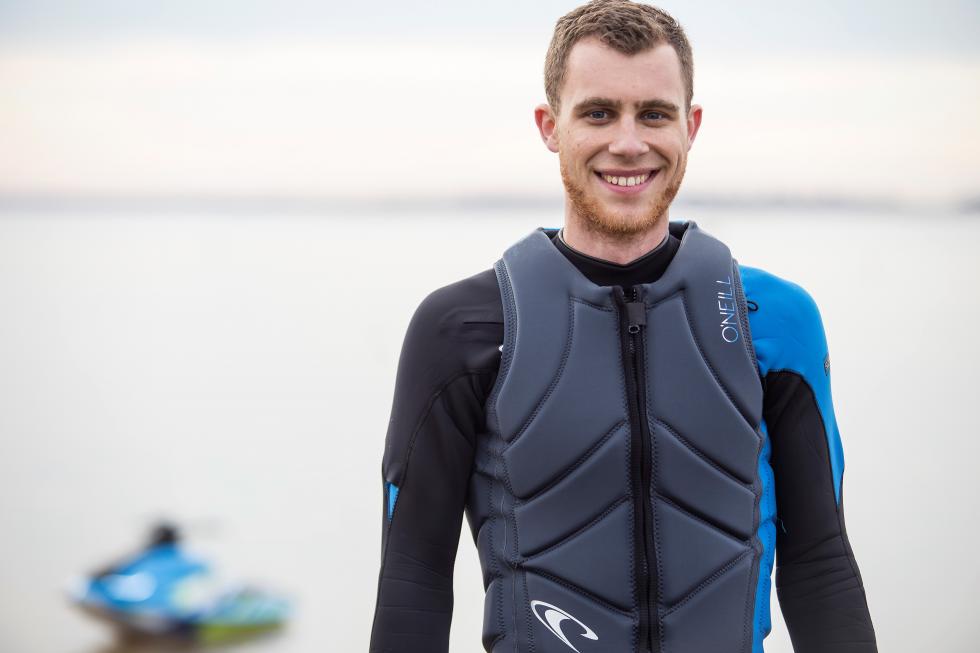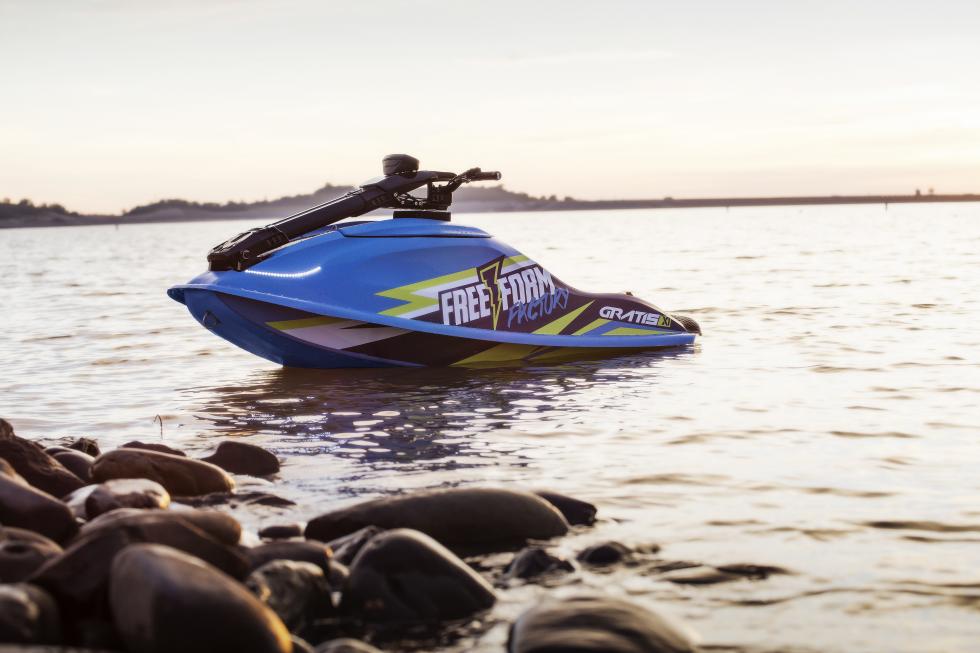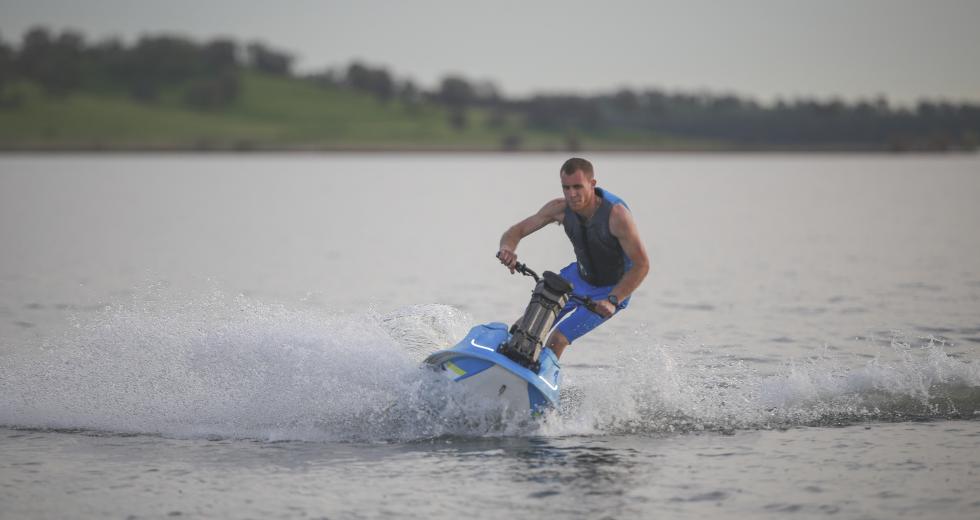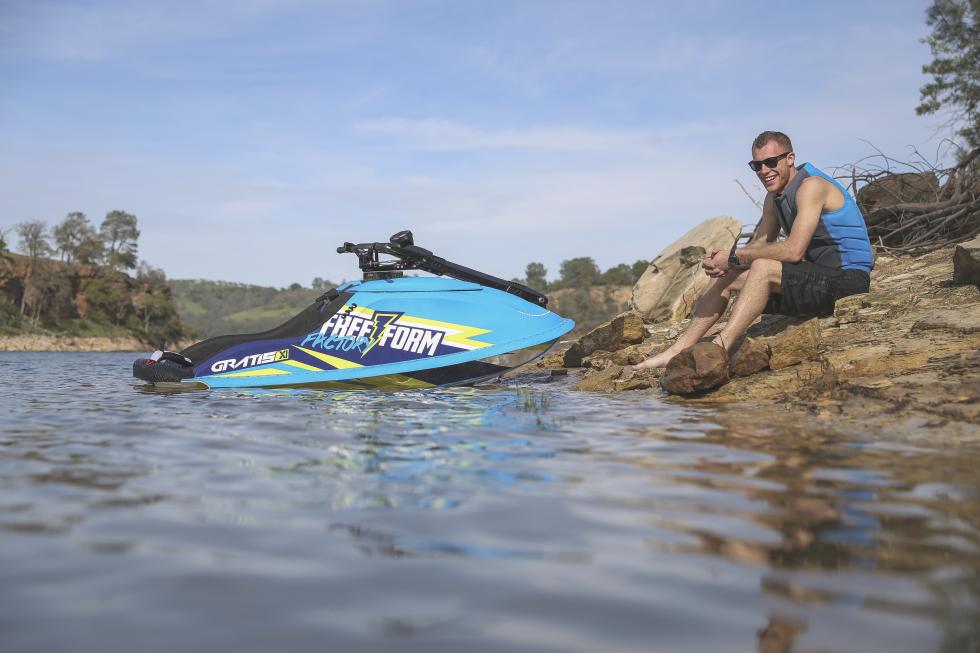From hockey to motocross to snowmobiles, Jordan Darling has always liked the challenge of new terrain. In high school, when he started jetskiing, a new world opened up to him. He wasn’t a top rider or competitor, but he chased waves, doing backflips with his younger brother. He would fly 10, sometimes 15, feet in the air. But what went up came down. Hard.
“When you’re progressing, you’re not going to always land your tricks,” Darling says. “I noticed that the hulls don’t take the beating they should. They broke several different ways.”
Jordan Darling is the founder of Free Form Factory.

He used to buy old Yamaha and Kawasaki jetskis to rebuild and resell them. Then, once he had the money, he built a new after-market competition watercraft to take his riding to the next level. But he wanted technology that was more stable and durable enough to handle the rigorous riding. The personal watercraft model hadn’t really changed since the 1970s — all the major manufacturers use fiberglass. But that material requires a lot of labor, which makes it expensive, Darling says. He wondered: Why doesn’t somebody make personal watercrafts out of unique polymer materials, which are far cheaper?
In 2014, Darling launched Free Form Factory, making after-market decks and hulls out of durable polymer material that he designed specifically for watercrafts. Two years later, the company relocated from Rochester, New York to Rancho Cordova. From a concept Darling drew up, Free Form Factory has unveiled a stand-up watercraft prototype that is 100-percent recyclable and electric-powered. The price tag is $17,990. Pre-orders are underway and the watercraft will be delivered this fall.
This month, Darling is starting a new round to raise up to $3 million from local angel investors and venture capitalists. Still, finding support hasn’t been smooth sailing: “No one had ever branched out and disrupted the space with new technology,” Darling says. “When the technology doesn’t progress, you’re choking the industry from growing.”
Ken Tallo was one of the early investors, part of a group that contributed the initial $500,000. He had started and invested in other companies before, but never a jetskiing startup. But Tallo didn’t see Free Form Factory as merely a watercraft company.
“This is well beyond watercraft,” says Tallo, who now unofficially consults the team on business development. “I look at the company as an advanced manufacturing technology company. We can go into transportation, aerospace, so many different directions.”
Darling also saw the potential of Free Form Factory as a manufacturing technology company, which would ultimately use material advancements and composite innovations across several commercial industries.
With a proprietary polymer material and manufacturing process, Darling believes his high-performance watercrafts will be game changers. The first model, the Gratis X1, is touted as the first zero-emission personal watercraft. Unlike gas-powered watercrafts, Free Form Factory’s model can access most of the world’s waterways without restrictions. You could ride this watercraft in Lake Tahoe, for example, and still “Keep Tahoe Blue.”
Free Form Factory makes personal watercrafts out of polymer
materials.

The material used in their designs is stronger and lighter than fiberglass, which appeals to Brandon Lawlor, a professional rider from Redwood City. But he noticed many other advantages when he tried out Free Form Factory’s watercraft. The wider stance, Lawlor says, makes it much more stable than traditional designs without sacrificing performance during freeride competitions.
“The stability and quickness of the hull makes spinning 360s in the wave very easy,” he writes in an email while training in Europe for the IFWA World Tour (International Freeride Watercraft Association). “I think this is a great ski for all levels from beginner to expert.”
Lawlor praises the design for its buoyancy, which allows him to land tricks easier. (The hardest trick he’s ever done was the double barrel roll.)
But the durability of these new models is the main draw, and Darling knows that. Freeriders can experience it firsthand, but for all the skeptical ones or non-wave-chasing types, he needs to demonstrate this another way. This is why, when he showcases Free Form Factory’s watercraft, Darling will smack the hull with a sledge hammer and declare to potential investors, “Ours can take the beating.”
Do you know an entrepreneur who has what it takes? Recommend their company for our “Startup of the Month” here.





Comments
Hi Russell,
We have a mutual friend in Laura Good, who is a great part of my business development world.
We would welcome an education about Comstock and what you are doing that we might compliment.
Huston Textile Company opened its manufacturing facility in the retired Mather Airfield property in March of 2017. Huston uses turn of the century American machinery to manufacture vintage cloth. Huston is the only west coast cloth manufacturer weaving (there are knitters, mostly in LA) shirt and denim sold directly to local and national designers.
Huston Textile Company aspires to be part of a modest and welcome moment, perhaps a pivotal moment, in the re-shoring of American textiles here in Sacramento.
Here are is some of the basics about Huston.
Principal: Ryan Huston, Managing Member (majority owner)
Company: Huston Textile Company LLC (DBA Huston Textile Company)
Address: 10035 Missile Way, Mather CA 95655
Contact: Scott Ragsdale, Huston Textile Company, Business Management
530-574-5253
Instagram: https://www.instagram.com/hust...
www.hustontextile.com
A short story about Huston Textile Company
Regional textile companies are not common, but there is a resurgence of interest in locally produced goods. Huston is one of the few, but growing number of companies bringing manufacturing back to the Sacramento region.
Huston Textiles is located in Rancho Cordova California and is owned and operated by Ryan Huston who has built, through his own ingenuity and resources, an operational textile mill. Huston Textile Company is one of a very few US textile companies that are currently sourcing organic fibers to make American premium quality cloth. Ryan’s passion for high-quality, self-reliance and local products has brought him to the attention of locally and nationally renowned clothing designers.
Huston Textile Company has received support from friends and family as well as Fibershed (Fibershed.org). Fibershed and regional farmers, designers and fiber production artisans are an important part of Huston Textile Company community.
Huston is part of the story of a growing community that is striking out to take back part of the business territory that has largely been the realm of global textile titans. Companies like Huston inspire a great deal of hope for self-reliance, vital local economy and a non-toxic cloth production, but for now Huston Textile Company is satisfied to just make excellent cloth one batch at a time.
Kind regards,
Scott Ragsdale
Business Management
Huston Textile Company
530-574-5253